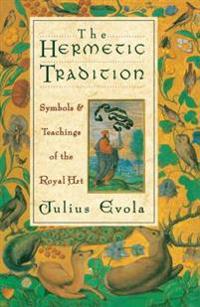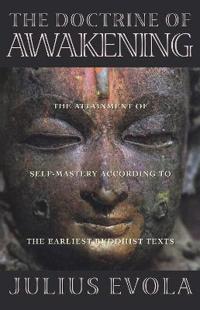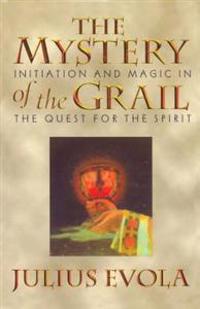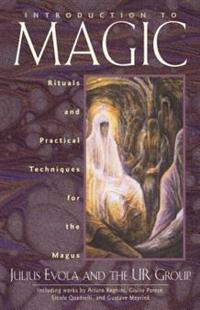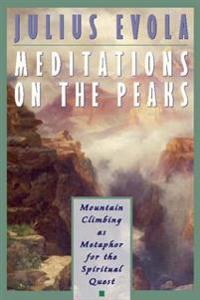The Hermetic Tradition (Pocket)
avJulius Evola, E. E. Rehmus, Julius Evola
ISBN: 9780892814510 - UTGIVEN: 199501This important survey of alchemical symbols and doctrines sets forth the mysterious worldview and teachings of the practitioners of the and royal art. One of the leading exponents of the Hermetic tradition, Julius Evola demonstrates the singularity of subject matter that lies behind the words of all[...]
The Doctrine of Awakening (Pocket)
avJulius Evola, H. E. Musson, Julius Evola
ISBN: 9780892815531 - UTGIVEN: 199602In a probing analysis of the oldest Buddhist texts, Julius Evola places the doctrine of liberation in its original context. The early teachings, he suggests, offer the foremost example of an active spirituality that is opposed to the more passive, modern forms of theistic religions. This sophisticat[...]
The Mystery of the Grail (Pocket)
avJulius Evola, Guido Stucco, Julius Evola
ISBN: 9780892815739 - UTGIVEN: 199611In this important study of the meaning of the Grail, one of Europe's greatest esoteric philosophers discloses the pre-Christian and initiatic sourcesof this symbolic motif that is so central to Western mythology and culture.He demonstrates how the main features of the legend are are from an older tr[...]
Social and Political Thought of Julius Evola (Häftad)
ISBN: 9780415831277 - UTGIVEN: 2013-02Julius Evola's writing covered a vast range of subjects, from a distinctive and categorical ideological outlook and has been extremely influential on a significant number of extreme right thinkers, activists and organisations. This book is the first full length study in English to present his politi[...]
Ride the Tiger (Inbunden)
avJulius Evola
ISBN: 9780892811250 - UTGIVEN: 200309Julius Evola's final major work, which examines the prototype of the human being who can give absolute meaning to his or her life in a world of dissolution
- Presents a powerful criticism of the idols, structures, theories, and illusions of our modern age
- Reveals how to tra[...]Eros and the Mysteries of Love (Pocket)
avJulius Evola
ISBN: 9780892813155 - UTGIVEN: 199104A comprehensive work on the metaphysical aspects of sexuality. Julius Evola sheds new light on the mystical and spiritual expression of sexual love. This in-depth study explores the sexual rites of sacred traditions, and shows how religion, mysticism, folklore, and mythology all contain erotic forms[...]
The Yoga of Power (Häftad)
avJulius Evola
ISBN: 9780892813681 - UTGIVEN: 1992-12Drawing from original texts on self-mastery, Evola discusses two Hindu movements--Tantrism and Shaktism--which emphasize a path of action to gain power over energies latent within the body.[...]
Revolt Against the Modern World (Inbunden)
avJulius Evola
ISBN: 9780892815067 - UTGIVEN: 199510In what many consider to be his masterwork, Evola contrasts the characteristics of the modern world with those of traditional societies, from politics and institutions to views on life and death.[...]
Introduction to Magic (Pocket)
avJulius Evola, Ur Group, Guido Stucco
ISBN: 9780892816248 - UTGIVEN: 200106Rare Hermetic texts published in English for the first time. Includes instructions for developing psychic and magical powers. In 1927 Julius Evola and other leading Italian intellectuals formed the mysterious UR group. Their goal: to bring their individual egos into a state of superhuman power and [...]
Meditations on the Peaks: Mountain Climbing as Metaphor for the Spiritual Quest (Häftad)
avJulius Evola
ISBN: 9780892816576 - UTGIVEN: 199802Evola articulates the close relationship between the physical rigors of mountain climbing and the ascent of the initiate toward self-transcendence.
Julius Evola, a leading exponent of esoteric thought, was also an ardent mountain climber who personally scaled the peaks of the Tyrols, Alps, and D[...]Men among the Ruins (Häftad)
avJulius Evola
ISBN: 9780892819058 - UTGIVEN: 200202Julius Evola's masterful overview of the political and social manifestations of our time, the "age of decline" known to the Hindus as the Kali Yuga.
- Reveals the occult war that underlies the crises that have become a prevailing feature of modern life.
- Includes H. T. Hanse[...]The Art of Julius Evola 1917 - 1922 (11 Color Paintings): (The Amazing World of Art, the Dada and Abstract Works) (häftad)
ISBN: 9781522989806 - UTGIVEN: 2016-01The Path of Enlightenment in the Mithraic Mysteries (Pocket)
avJulius Evola
ISBN: 9781558182288 - UTGIVEN: 1993-09The Path of Cinnabar (Häftad)
avJulius Evola
ISBN: 9781907166020 - UTGIVEN: 200906Julius Evola was a renowned Dadaist artist, Idealist philosopher, critic of politics and Fascism, 'mystic', anti-modernist, and scholar of world religions. Evola was all of these things, but he saw each of them as no more than stops along the path to life's true goal: the realisation of oneself as a[...]
The Path of Cinnabar (Inbunden)
avJulius Evola
ISBN: 9781907166037 - UTGIVEN: 200906Julius Evola was a renowned Dadaist artist, Idealist philosopher, critic of politics and Fascism, 'mystic,' anti-modernist, and scholar of world religions. Evola was all of these things, but he saw each of them as no more than stops along the path to life's true goal: the realisation of oneself as a[...]
Fascism Viewed from the Right (Häftad)
avJulius Evola
ISBN: 9781907166853 - UTGIVEN: 201302In this book, Julius Evola analyses the Fascist movement of Italy, which he himself had experienced first-hand, often as a vocal critic, throughout its entire history from 1922 until 1945. Discussing - and dismissing - the misuse of the term 'fascism' that has gained widespread acceptance, Evola ask[...]
Notes on the Third Reich (Häftad)
avJulius Evola
ISBN: 9781907166860 - UTGIVEN: 201304In the same manner as he critiqued Italian Fascism in Fascism Viewed from the Right, in this volume Evola analyses the German National Socialist movement, making a distinction between National Socialism as an ideology and the contingent circumstances which led to its defeat in the Second World War. [...]
Fascism Viewed from the Right (Inbunden)
avJulius Evola
ISBN: 9781907166921 - UTGIVEN: 2013-02In this book, Julius Evola analyses the Fascist movement of Italy, which he himself had experienced first-hand, often as a vocal critic, throughout its entire history from 1922 until 1945. Discussing - and dismissing - the misuse of the term 'fascism' that has gained widespread acceptance, Evola ask[...]
Notes on the Third Reich (Inbunden)
avJulius Evola
ISBN: 9781907166938 - UTGIVEN: 2013-06In the same manner as he critiqued Italian Fascism in Fascism Viewed from the Right, in this volume Evola analyses the German National Socialist movement, making a distinction between National Socialism as an ideology and the contingent circumstances which led to its defeat in the Second World War. [...]

